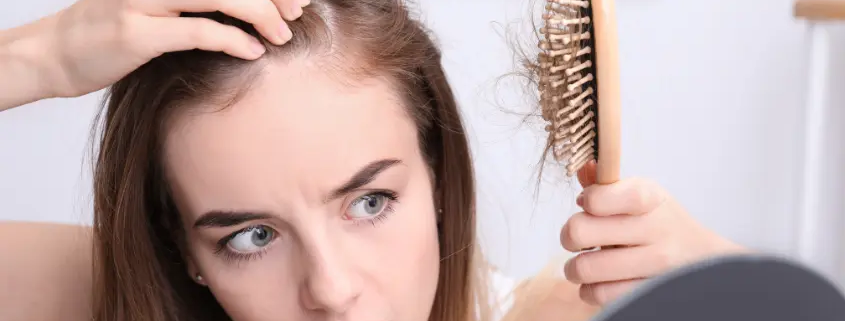Vitamins for Frontal Fibrosing Alopecia: A Guide for Healthy Hair
Understanding Frontal Fibrosing Alopecia
Losing hair can be tough, and it can make you feel less confident. To treat it, we need to know why it happens. Frontal Fibrosing Alopecia, an autoimmune disease causing hair loss is still a bit of a mystery, but scientists are working hard to understand it.
Why Hair Falls Out?
Hair grows because of a mix of things like hormones, genes, and your immune system. At the bottom of each hair is something called the “dermal papilla,” which gives your hair what it needs to grow. In patients with frontal fibrosing alopecia, their immune system attacks these hair spots, and that makes the hair fall out. “Lichen planopilaris” is also another form of FFA.
Spotting Frontal Fibrosing Alopecia and its Treatment Options
The first step to fixing Frontal Fibrosing Alopecia is knowing its signs and symptoms. Besides losing hair at the front of your head, you might feel itchy, see redness, have poor hair follicles health, or have swelling. It’s super important to see a skin doctor (dermatologist) to be sure you have Frontal Fibrosing Alopecia and not something else. Treatments for frontal fibrosing alopecia include mainly medication and supplements. In case of total hair loss, a hair transplant is the preferred option.
Why Vitamins Matter
Vitamins are like the helpers that keep your hair strong and healthy. Several retrospective study says that they play an important role in lots of things your body does, including growing hair. You need to eat right to get these vitamins, especially if you have Frontal Fibrosing Alopecia or want to keep your hair looking good.
Eating Right for Hair Growth
Just like your body, your hair needs good food to stay healthy. You have to eat foods with proteins, vitamins, and minerals. This gives your hair what it needs to grow well and not fall out.
Vitamins That Help Your Hair
Certain vitamins are like superheroes for your hair. Let’s talk about some of these vitamins and how they help:
1. Vitamin A: It makes a special oil that keeps your scalp hair from getting too dry. Plus, it helps your hair grow back if it falls out.
2. Vitamin C: This vitamin fights bad stuff that can hurt your hair. It also helps your hair stay strong.
3. Vitamin D: Vitamin D levels keep your hair spots healthy. It also stops your immune system from attacking your hair. Several hair loss conditions are the result of vitamin D deficiency.
4. Vitamin E: Vitamin E is like armor for your hair. It keeps your hair spots safe from harm and makes sure they get enough food.
5. B Vitamins: Biotin, niacin, and pantothenic acid are part of the B vitamin team. They help make a special protein called “keratin,” which your hair is made of.
Best Vitamins for Frontal Fibrosing Alopecia
Some vitamins are even more important if you have Frontal Fibrosing Alopecia. Let’s check them out:
Vitamin D and Hair Loss: Not having enough vitamin D might be linked to Frontal Fibrosing Alopecia. Some studies say that getting more vitamin D can help your immune system stop attacking your hair. But we need more research to know for sure how much you should take.
B Vitamins and Hair Loss: Biotin is like a secret weapon for hair. It can make your hair strong and thick. Niacin and pantothenic acid help your hair spots get enough food and grow.
Antioxidant Vitamins and Hair: Vitamins A, C, and E are like shields for your hair. They stop bad things in your body from hurting your hair. You can eat foods with these vitamins or ask your doctor if you need to take supplements.
Getting Vitamins in Your Diet
The best way to get vitamins is by eating yummy foods. Here are some foods to try:
– To get vitamin A, eat carrots, sweet potatoes, and leafy greens.
– For vitamin C, try citrus fruits, strawberries, and bell peppers.
– Get your vitamin D from fish like salmon and dairy foods with extra vitamin D.
– Eat nuts, seeds, and spinach for vitamin E.
– B vitamins are in whole grains, eggs, and beans.
Using Vitamin Supplements
Sometimes, it’s hard to eat enough vitamins in your food. That’s when supplements can help. But talk to a doctor or a diet expert first. They can tell you how much you need and what kind of vitamins to take. Remember, supplements are like extra helpers, not a replacement for good food.
Watch Out for Problems
Vitamins are great, but you can have too much of a good thing. Taking too many vitamins can be bad for you. For example, too much vitamin A can make your hair fall out. So, be careful and ask a pro for advice.
Vitamins and Medicines
If you’re taking any medicines, be careful with vitamins. Some vitamins can stop your meds from working or make them less safe. Talk to a doctor or a pharmacist to make sure vitamins and meds play nicely together.
Conclusion
Vitamins can’t cure patients with FFA and Alopecia all by themselves, but they can help make your hair stronger and healthier. Eating the right foods is the best way to get vitamins. If you have Frontal fibrosis alopecia, certain vitamins might help even more. But always talk to a doctor before you start taking vitamins. Keep eating good food, and your hair will thank you!
Personalized DNA tests can be like secret detectives for our hair. They look at our genes and tell us exactly what our hair needs to stay happy and shiny. So, it’s like having a special plan just for our hair to make it look its best!
Discover your unique hair loss risks and empower your hair care journey with our revolutionary HairLife DNA test. Learn more about the HairLife DNA test now!





